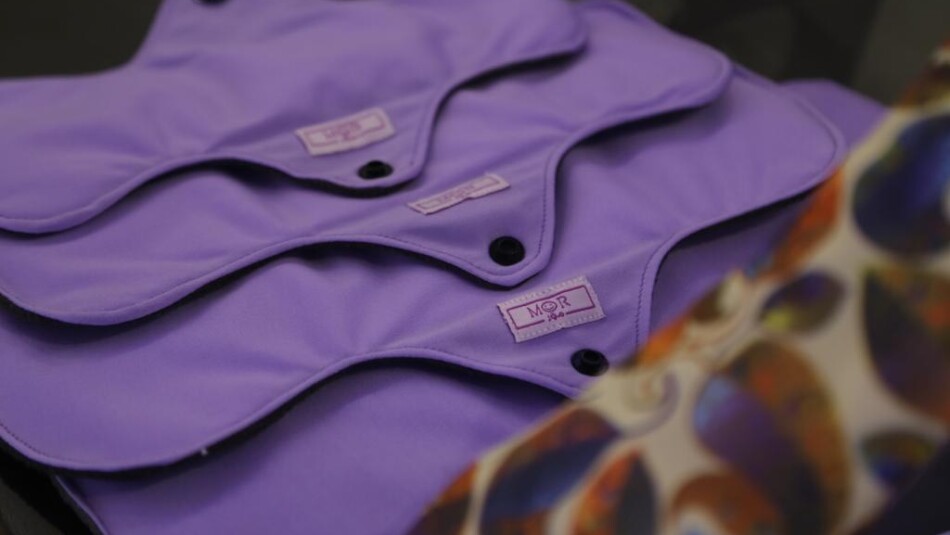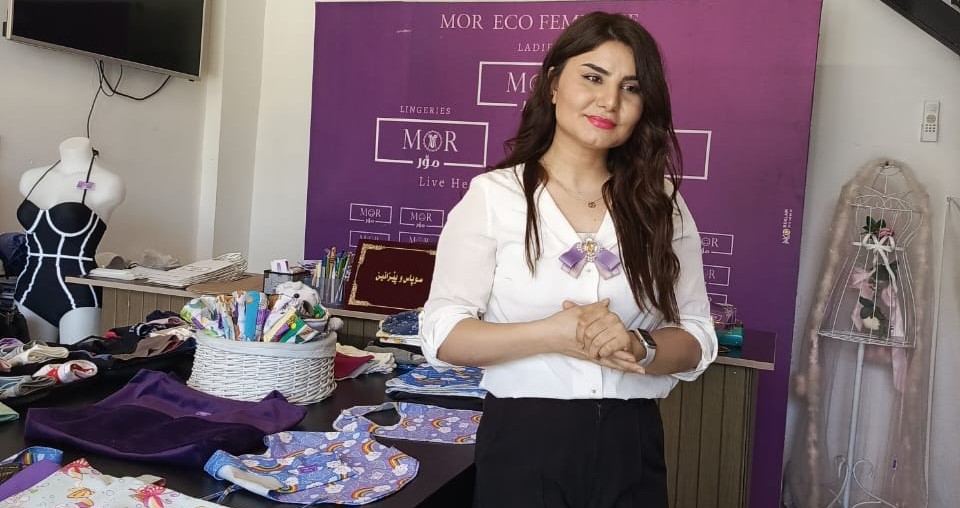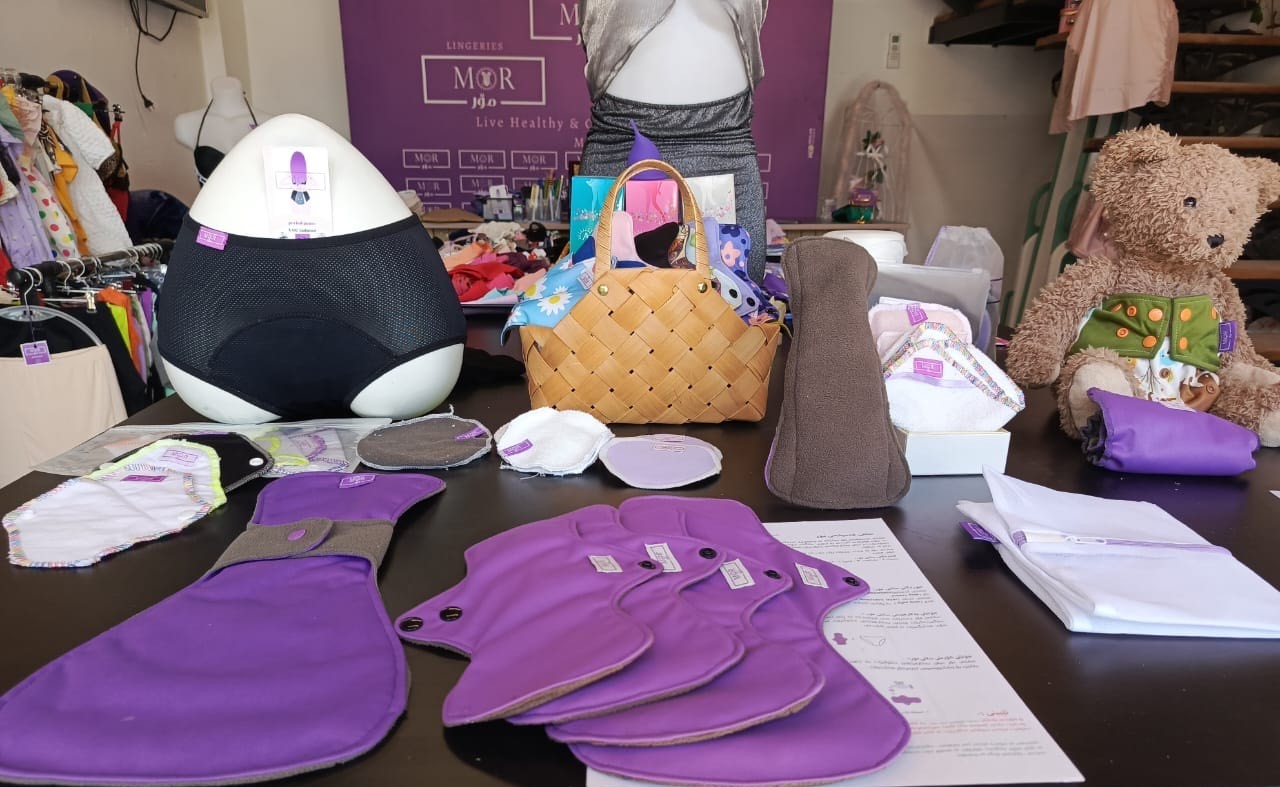
Out of a particular temporary discomfort, the idea of a new project was born, two sisters decided to turn the difficult experience of menstruation into an opportunity to create healthy and eco-friendly products.
Pads, baby diapers and some women’s essentials are among the notable products of the initiative: small, reusable and non-disposable products, which aim to improve the well-being of women and girls, along with innovative solutions to reduce waste.
“We use high quality fabrics to produce the best type of pads that women can use and reuse,” said Shanaw Jalal, owner of the Mor brand who assured their products are reusable, since it can be washed and cleaned.
“I have used more than 30 types of fabrics for my products. I have spent four years testing to see which fabrics and materials are good and so that no one criticizes my products and project” said Shanaw who runs the business with one of her sisters. Her products are known for being eco-friendly among some women and children.
Commercial pads and diapers are considered one of the most dangerous products for humans and the environment, because they contain nylon, plastic and chemicals, while most are made for disposable use and then disposed of, or burned, or buried but to be decompose it takes hundreds of years.
I spent four years experimenting to find which fabrics and materials are good
Mor: a color for women and the environment
Mor's initiative dates back five years ago, but the idea was born much earlier. “I got my period myself, but then we had nothing, I was very uncomfortable, I made my own pads from fabrics at home. In my mind I wanted to do something for women. It was an opportunity to do something so that women and girls do not pass through what I did.”
She turned her dream into action and spent all her capital on a small project.
“We have been working for five years, we are self-reliant and we are doing a loyal job, not just thinking about making money,” she defiantly said. “We did a thorough follow up with my sister to improve quality of diapers and women needs.”
She has decided to name her project (Mor) because she likes purple color.
Mor products compete the popular products which are mostly nylon and plastic, used in the manufacture of 400 million tons of plastic waste worldwide annually, according to the United Nations, only 9% of it is recycled, 12% is burned and 79% is mixed with nature and the environment.
"We always advise girls and women who come to us to use pads that are cloth, nylon-free, simple and odorless, because infection occurs more quickly at these times," said Sumaya Ata Naqshbandi, a gynecologist in Sulaymaniyah.
Polyester fabric (nylon fabric – made industrially, not cloth) takes 200 years to decompose in the environment, although the production of one kilogram of cloth requires 7,500 to 10,000 liters of water, but the use or reuse of cloth is the least harmful environment.
“Our products have been used (continuously) for two years and the fabrics we use are all cloth, anti-odor, anti-allergy and environmentally friendly.”

They import materials from Europe, Canada and Australia. They coordinate with gynecologists to further investigate the defects of commercial pads and the market and eliminate these risks in their products and protect their customers from diseases caused by bad materials.
Plastic, in the composition of any product, is among the main causes of cancer. Last year, more than 3,350 cases were registered in Sulaimaniya province alone compared to 3,150 cases in the last ten months.
Dr. Mohammed Abdulwahhab, head of the cancer control department in Sulaimaniya, said: "The World Health Organization has proven that one of the main causes of cancer is plastic, because first it takes a long time to decompose and second it decomposes into nature and negatively affects food products.”
In the Kurdistan Region of Iraq KRI, more than 6,000 tons of household garbage is collected daily, most of which is mixed and indistinguishable, including diaper and pad waste.
Dr. Shagul Abubakr, a university professor and researcher at the Kurdistan Board for Strategic and Scientific Research, said, “Nylon and plastic do not end up decomposing in nature and becoming micro plastics. It also affects the soil and the environment.”
Since she is familiar with the Mor products, which are environmentally friendly and reduce the risk, she explained that the products of diapers and pads on the market, cause environmental damage because they contain nylon and then harmful to humans.
Mor has become a semi-factory, selling seven different products such as women's and children's accessories, some of which are made on demand.
I have no infections or health problems after using their products
“For example, the characteristics of the diapers are such that they do not cause any sensitivity and redness for the baby. Our products are shipped to all Iraqi cities and are in demand in European countries,” Shanaw said.
“We use the best quality cloth in our products which has two-year guarantee.”
Dermatologists agree with gynecologists that cotton products are safer for women compared to commercial menstrual (sanitary) pads.
"The use of cloth products reduces allergies, infectious diseases, skin redness and bacteria," said Gashin Kamal Shah Mohammed, a dermatologist and cosmetologist. However, she prefers disposable use of the products yet since it is cotton, reuse might not cause health problems.
Satisfied customer: better health and lower expenses
Customers of Mor products, especially those who are environmentally friendly like it, worry less and spend less than before.
"Children need a lot of diapers from the beginning of their lives, but the product is for two years and may be several pieces will be enough until they grow up," said Nishtiman Hassan, an economist.
Iraq is the fifth most affected country by climate change, and the United Nations is encouraging people to reduce their purchases and rely on reusable products.
“After using their pads, I have no infections or health problems,” says Chovian Niga, who has been using Mor's products for a year and three months. “It is not thrown away and does not increase waste.”
More than 10,000 menstrual pads and more than 1,500 diapers are part of Mor's production, along with some women's clothing, bags and other items.

Dashne Abubakir Hussein, a pediatrician, was introduced to the Mor brand through an environmentally friendly friend, so she decided to use it.
“Those kids who come to my clinic suffering from itchiness, I recommend the products to their mothers since it is beneficial in terms of economy and health as well.”
The hot market for Mor's products is mostly through social media platforms.
“I have used them and have benefited a lot,” said Bestan Rasti, a resident physician.
Meanwhile, Tabin Hama Saeed, a civil engineer who has been using Mor products for more than a year, said, “I have been using these products because they are odorless and I have no problems with allergies and redness." she encouraged her sisters to use it too.
According to Shanga Jalal, they have three employees and with other demands, they will hire more employees and teach them the profession through training.
“I came to work and now I have used the products myself and have benefited a lot,” said Shene Hogar, who works for the brand and uses its products.
Struggling with obstacles
Mor's products must be reused, which means re-washing and cleaning, which is one of the difficulties that makes some women reluctant to buy them.
“I am not willing to use it. It is economically useful, but I cannot wash it,” said Kosar Kamal, On the other hand, Tabin Hama Saeed said, “It is very easy to wash and I have no problems with it.”
We cannot ban materials containing plastic and nylon
The fashion industry, which includes women's accessories, is the second largest source of environmental pollution and the least recycled.
Dr. Nishtiman Hassan believes that many girls and women refrain using it less because it is reusable and requires washing, which is difficult, especially for some mothers.
Easy access and import of commercial materials, especially those containing nylon and plastic, are reducing demand for environmentally friendly products.
Mustafa Juma, spokesman for the Sulaimania Environment Office, said the brand is small and has not become a factory, so they do not have a registration.
Lack of cooperation, especially finance and access to high quality fabrics, were other challenges to Shanaw Jalal's initiative.
The owner of the Mor brand imports fabrics from abroad, sometimes doctors and experts prescribe healthy and environmentally friendly fabrics affordability is a hurdle, with opening up shop under her brand name, calling that one of the “biggest obstacles”.
Whatever the challenges, Shanaw Jalal insists to go on, taking further steps and wants to expand her brand, from the several-meter shop in Sulaimania, which is also a place of production, sales and warehouse of materials to open branches in each of KRI cities.